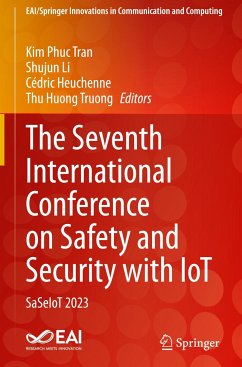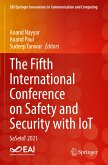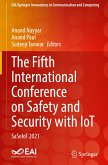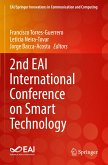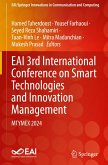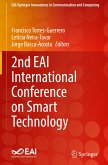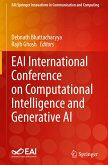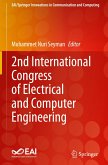The Seventh International Conference on Safety and Security with IoT
SaSeIoT 2023
Herausgegeben:Tran, Kim Phuc; Li, Shujun; Heuchenne, Cédric; Truong, Thu Huong
The Seventh International Conference on Safety and Security with IoT
SaSeIoT 2023
Herausgegeben:Tran, Kim Phuc; Li, Shujun; Heuchenne, Cédric; Truong, Thu Huong
- Gebundenes Buch
- Merkliste
- Auf die Merkliste
- Bewerten Bewerten
- Teilen
- Produkt teilen
- Produkterinnerung
- Produkterinnerung
This book presents the Fifth International Conference on Safety and Security with IoT (SaSeIoT 2023), which took place Bratislava, Slovakia, October 24-26, 2023. The conference aims to explore not only IoT and its related critical applications but also IoT towards Security and Safety. The conference solicits original and inspiring research contributions from experts, researchers, designers, and practitioners in academia, industry and related fields and provides a common platform to share knowledge, experience and best practices in various domains of IoT.
Andere Kunden interessierten sich auch für
![The Fifth International Conference on Safety and Security with IoT The Fifth International Conference on Safety and Security with IoT]() The Fifth International Conference on Safety and Security with IoT108,99 €
The Fifth International Conference on Safety and Security with IoT108,99 €![The Fifth International Conference on Safety and Security with IoT The Fifth International Conference on Safety and Security with IoT]() The Fifth International Conference on Safety and Security with IoT108,99 €
The Fifth International Conference on Safety and Security with IoT108,99 €![2nd EAI International Conference on Smart Technology 2nd EAI International Conference on Smart Technology]() 2nd EAI International Conference on Smart Technology177,99 €
2nd EAI International Conference on Smart Technology177,99 €![EAI 3rd International Conference on Smart Technologies and Innovation Management EAI 3rd International Conference on Smart Technologies and Innovation Management]() EAI 3rd International Conference on Smart Technologies and Innovation Management169,99 €
EAI 3rd International Conference on Smart Technologies and Innovation Management169,99 €![2nd EAI International Conference on Smart Technology 2nd EAI International Conference on Smart Technology]() 2nd EAI International Conference on Smart Technology177,99 €
2nd EAI International Conference on Smart Technology177,99 €![EAI International Conference on Computational Intelligence and Generative AI EAI International Conference on Computational Intelligence and Generative AI]() EAI International Conference on Computational Intelligence and Generative AI154,99 €
EAI International Conference on Computational Intelligence and Generative AI154,99 €![2nd International Congress of Electrical and Computer Engineering 2nd International Congress of Electrical and Computer Engineering]() 2nd International Congress of Electrical and Computer Engineering139,99 €
2nd International Congress of Electrical and Computer Engineering139,99 €-
-
-
This book presents the Fifth International Conference on Safety and Security with IoT (SaSeIoT 2023), which took place Bratislava, Slovakia, October 24-26, 2023. The conference aims to explore not only IoT and its related critical applications but also IoT towards Security and Safety. The conference solicits original and inspiring research contributions from experts, researchers, designers, and practitioners in academia, industry and related fields and provides a common platform to share knowledge, experience and best practices in various domains of IoT.
Produktdetails
- Produktdetails
- EAI/Springer Innovations in Communication and Computing
- Verlag: Springer / Springer Nature Switzerland / Springer, Berlin
- Artikelnr. des Verlages: 978-3-031-53027-2
- 2024
- Seitenzahl: 160
- Erscheinungstermin: 19. März 2024
- Englisch
- Abmessung: 241mm x 160mm x 15mm
- Gewicht: 356g
- ISBN-13: 9783031530272
- ISBN-10: 3031530276
- Artikelnr.: 69693584
- Herstellerkennzeichnung Die Herstellerinformationen sind derzeit nicht verfügbar.
- EAI/Springer Innovations in Communication and Computing
- Verlag: Springer / Springer Nature Switzerland / Springer, Berlin
- Artikelnr. des Verlages: 978-3-031-53027-2
- 2024
- Seitenzahl: 160
- Erscheinungstermin: 19. März 2024
- Englisch
- Abmessung: 241mm x 160mm x 15mm
- Gewicht: 356g
- ISBN-13: 9783031530272
- ISBN-10: 3031530276
- Artikelnr.: 69693584
- Herstellerkennzeichnung Die Herstellerinformationen sind derzeit nicht verfügbar.
Kim Phuc Tran is currently a Senior Associate Professor (Maître de Conférences HDR, equivalent to a UK Reader) of Artificial Intelligence and Data Science at the University of Lille, Graduate School MADIS-631, ENSAIT, & GEMTEX laboratory, France. He received an Engineer's degree and a Master of Engineering degree in Automated Manufacturing. He obtained a Ph.D. in Automation and Applied Informatics at the University of Nantes, and an HDR (Doctor of Science or Dr. Habil.) in Computer Science and Automation at the University of Lille, France. He has published more than 72 papers in peer-reviewed international journals and proceedings of international conferences. He edited 3 books with Springer Nature and Taylor & Francis. He is the Associate Editor, Editorial Board Member, and Guest Editor for several international journals such as IEEE Transactions on Intelligent Transportation Systems and Engineering Applications of Artificial Intelligence. Kim Phuc Tran has supervised 12 Ph.D. students and 3 Postdocs. In addition, as the project coordinator (PI), he conducted a national project about Healthcare Systems with Federated Learning. He has been or is involved (PI, co-PI, or member) in 13 national and European projects. He is an expert and evaluator for the Public Service of Wallonia (SPW-EER), Belgium, the Natural Sciences and Engineering Research Council of Canada, ANRT (Association nationale de la recherche et de la technologie), and CY Cergy Paris University, France. He received the Award for Scientific Excellence (Prime d'Encadrement Doctoral et de Recherche) given by the Ministry of Higher Education, Research and Innovation, France for 4 years from 2021 to 2025 in recognition of his outstanding scientific achievements. From 2017 until now, he has been the Senior Scientific Advisor at Dong A University and the International Research Institute for Artificial Intelligence and Data Science (IAD), Danang, Vietnam where he has held the International Chair in Data Science and Explainable Artificial Intelligence. His research interests include Explainable Trustworthy, and Transparent Artificial Intelligence; Ethical, and Human-centered Artificial Intelligence; Safety and Reliability of Artificial Intelligence; Statistical Computing; Intelligent Decision Support Systems; Digital Twins; and Applications of AI, Edge Computing, and Data Science in Industry 5.0. Shujun LI is Professor of Cyber Security at the School of Computing, University of Kent in the UK. He is Director of the Institute of Cyber Security for Society (iCSS), which represents the University of Kent as one of 19 UK government recognised Academic Centres of Excellence in Cyber Security Research (ACEs-CSR). His research interests are mostly around interdisciplinary topics covering cyber security and privacy, human factors, digital forensics and cybercrime, social media analytics, and AI. He has published over 100 research papers at international journals and conferences and received five Best Paper Awards including the 2022 IEEE Transactions on Circuits and Systems Guillemin-Cauer Best Paper Award. He is a Fellow of BCS, a Senior Member of IEEE, and a Member of ACM. Therefore, he will be able to provide the expert knowledge on cyber security and privacy part of the project. C. Heuchenne holds a Master's degree in Applied Sciences and a Ph.D. in Statistics from the Catholic University of Louvain and has more than 16 years working as a Statistics/Data Science professor at the University of Liège and UCLBrussels. His research concerns different applied and theoretical fields like survival or duration data analysis, nonparametric statistical inference, machine learning, statistical process control, quality management, or risk modeling. He published more than 45 articles in prestigious peer-reviewed scientific journals (with impact factor and indexed by Scopus), more than 30 articles presented at international conferences andhe has been invited by more than 30 universities for seminars, workshops and research stays. He also participated in writing some chapters of statistics/finance/engineering books, has been working for two scientific journals as associate editor, and supervised 6 completed Ph.D. Theses. Besides, he got supported by five important projects funded by Belgian/European funds (more than 400000 euros each) and supervised the whole process from the research content to the management of research groups (he hired more than 20 persons -doctoral students and post-docs-) and the communication with partners (other universities and companies). Truong Thu Huong received her B.Sc. in Electronics and Telecommunications in 2001 from Hanoi University of Science and Technology (HUST), where she is currently giving lecture and doing research. Being funded in by DAAD-the German Government Fund, she then achieved her Master of Science in Information and Communication Systems from the Technical University of Hamburg-Harburg (TUHH), Germany, in 2004. From 2004 till 2007, she pursued her Ph.D. career at the University of Trento, Italy. From 2009 to now, her educational, research, and development work is oriented toward Network Security, development of Internet of Things ecosystems and applications, Artificial Intelligence, next generation networks, protocols and mechanism, traffic analysis, QoE/QoS measuring, green networking, and deployment of new integrated multimedia services into fixed and mobile networks, Virtual Reality. During her academic career, Huong has achieved 2 best paper awards for the articles she co-authored in the IEEE ICC 2007 and IEEE ATC 2014. She also a recipient of 3 Excellent-Teacher-of-the-Year Awards provided by the Ministry of Education and Training and Hanoi University of Science and Technology. She serves multiple international conferences as program committee member, and session chair. She also supports some international journals as reviewer. Huong is now a member of the IEEE society, IEEE ComSoc, and Vice chair of HUST Association for Intellectual Women.
Introduction.- IoT Security Protocols and Architectures.- Threats, Risks, Vulnerability, and Countermeasures in IoT.- Lightweight Cryptography for IoT, Blockchain for IoT, Fog/Edge Computing for IoT.- Security and Privacy.- Privacy, Liability, and Legal Issues in IoT.- Artificial Intelligence of Things.- Real-Time Case Studies, Applications, Testbests, and Experimentation Platforms for IoT Security.- Towards a Low-Cost Intelligent IoT edge.- Machine learning/Embedded Machine Learning for IoT Applications.- Internet of Things and Embedded Machine Learning.- Conclusion.
Introduction.- IoT Security Protocols and Architectures.- Threats, Risks, Vulnerability, and Countermeasures in IoT.- Lightweight Cryptography for IoT, Blockchain for IoT, Fog/Edge Computing for IoT.- Security and Privacy.- Privacy, Liability, and Legal Issues in IoT.- Artificial Intelligence of Things.- Real-Time Case Studies, Applications, Testbests, and Experimentation Platforms for IoT Security.- Towards a Low-Cost Intelligent IoT edge.- Machine learning/Embedded Machine Learning for IoT Applications.- Internet of Things and Embedded Machine Learning.- Conclusion.

